| |
FLASHBACK
#04
Vancouver Jazz Festival 1995
by Frank Rubolino
photographs by Steve Robinson
January 2001
The Vancouver Jazz Festival is a mammoth event spanning ten days and
covering multiple styles of jazz. With over 200 concerts from which
to chose, the fan has the ability to concentrate on a specific genre
or to sample a bit of it all. I chose to seek out the innovative side
that distinguishes this festival and has made it one of the most successful
in North America. I was very fortunate to make the acquaintance of
Steve Robinson, a noted photographer who clicked his way through many
of the shows I attended. His dynamic pictures of artists in action
are featured in this article that capsulizes some of the performances
I witnessed. Ten overly full days of music is a lot to absorb; yet
I squeezed in about 60 acts without overdosing on the sounds. Here
are the highlights from some of the shows I attended:
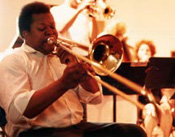 The NOW Orchestra opened the festival for me, performing original
compositions by George Lewis. He was a master at directing and evoking
both sound and spirit from the ensemble. His work featured the voice
of Kate Hammett-Vaughn, who emulated a musical instrument with her
phrasing. The music ran the gamut from bebop on forward, but it was
most stirring when Lewis played with 13 free-form voices sounding
wondrously cacophonous. Other standouts were Paul Plimley, Saul Berson,
and Paul Blaney, although all shined when given their cue to solo
by Lewis.
The NOW Orchestra opened the festival for me, performing original
compositions by George Lewis. He was a master at directing and evoking
both sound and spirit from the ensemble. His work featured the voice
of Kate Hammett-Vaughn, who emulated a musical instrument with her
phrasing. The music ran the gamut from bebop on forward, but it was
most stirring when Lewis played with 13 free-form voices sounding
wondrously cacophonous. Other standouts were Paul Plimley, Saul Berson,
and Paul Blaney, although all shined when given their cue to solo
by Lewis.
A few nights later, René Lussier and Pierre Tanguay were guest
directors of the orchestra. Lussier's composition was a giant opus
that crystallized the collective talent of the NOW orchestra. Done
in several movements, the suite went from free form shouting to structured
parts, then back to controlled chaos, and round and round. Everyone
was featured, including Tanguay who fiercely attacked the drums. Hammett-Vaughn
did not have the same spotlight she enjoyed when George Lewis directed
the band, but she was effective in small parts. The group was well
rehearsed and responded flawlessly to Lussier's direction. It was
an exciting and loud evening that had the blood pumping if only through
sheer volume.
Upbeat,
semi-free, semi-structured music came from Joey Baron's Barondown
trio. There was excellent tenor/trombone rapport and great interplay
between Ellery Eskelin and Steve Swell. Baron remained always as
the driver and always in control. Eskelin, a new discovery for me
at that time, showed both power and imagination. Although the tunes
grew progressively more adventuresome, the street crowd remained
into it. The second performance in a late-night club setting was
just as powerful, with Eskelin and Swell stretching out while Baron
had an obvious ball as the maestro of this dynamic group.
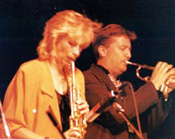 Jane Bunnett's band gave an amazing performance. The union with Jeanne
Lee was ingenious. This group's presentation was very professional
and polished, yet not slick. Bunnett has mastery over the soprano,
and her interplay with Lee's voice was astounding. Piano player Daryl
Grant was a fine addition in filling the void left by the death of
Don Pullen. Power-plus drummer Andrew Cyrille was a remarkable sight,
while trumpeter Larry Cramer added a complementary touch. Several
tunes were from Bunnett's then-recent release The Water Is Wide
(which included Pullen), but they were given a fresh reading—especially
Rahsaan Roland Kirk's "Serenade To A Cuckoo". Bunnett maneuvered the
band skillfully. This set was a real treat to hear and see.
Jane Bunnett's band gave an amazing performance. The union with Jeanne
Lee was ingenious. This group's presentation was very professional
and polished, yet not slick. Bunnett has mastery over the soprano,
and her interplay with Lee's voice was astounding. Piano player Daryl
Grant was a fine addition in filling the void left by the death of
Don Pullen. Power-plus drummer Andrew Cyrille was a remarkable sight,
while trumpeter Larry Cramer added a complementary touch. Several
tunes were from Bunnett's then-recent release The Water Is Wide
(which included Pullen), but they were given a fresh reading—especially
Rahsaan Roland Kirk's "Serenade To A Cuckoo". Bunnett maneuvered the
band skillfully. This set was a real treat to hear and see.
Paul Plimley & Joey Baron represented instant composing at its best.
How two men who had never met before this event could read each other
perfectly while exploring such difficult music is a wonder. Plimley
played in unstructured format at times, but he also developed a melodic
stream and then reverted to atonal progressions. You had to witness
their interplay to get the full impact, which was spontaneous and
flawless. Artistry such as this is not seen often, and when it is
created on the spot, it is joyous.
Dave Holland's performance was simply wonderful. He laid down such
a strong bass line that it permeated the entire over-packed hall
and obviously inspired the other artists. Eric Person was an outstanding
contributor to the Quartet, and on two tunes, he created an out-of-body
experience for me with his raw intensity combined with the thunderous
propulsion of Gene Jackson's drums. Steve Nelson's vibes provided
a form of contrast. He had to play with gusto to match the emotion
of the others. The concert lasted almost two hours with no breaks,
and every tune was an extended piece. Holland was overwhelming on
his deep-toned solos that never faltered. He carried every selection
with amazing strength and was a marvel of stamina. This is what the
music is all about.
The Evan Parker Trio was another festival highlight, with incredibly
free and spontaneous improvising coming from all. Parker was in a
groove of demanding blowing on both occasions on soprano and tenor,
while Guy was magical with his deft manipulation of the strings.
Guy coaxed amazing sounds out of the instrument, frequently turning
it into a percussion tool. The group reached astounding peaks during
both concerts and left the audiences drained. It was a compelling,
exhilarating, constant stream of sound with an intensity level to
match. These three musicians performed wondrously together.
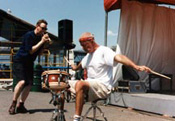 Han
Bennink was up to his antics again, this time with pianist Beresford.
The game was the same, only the opponent different. Beresford tried
to compete with Bennink's comedy while playing a small horn and partially
succeeded. If they had played it straight, it could have been an interesting
duet. As it was, it was show time. Han
Bennink was up to his antics again, this time with pianist Beresford.
The game was the same, only the opponent different. Beresford tried
to compete with Bennink's comedy while playing a small horn and partially
succeeded. If they had played it straight, it could have been an interesting
duet. As it was, it was show time.
It was
difficult to distinguish the written parts from the improvisations,
but the collective sound of ROVA was so good, it did not matter.
Their work demands a high degree of concentration, but the rewards
for making the effort are great. ROVA played collectively or in
various pairings in exploring the depths of their compositions.
Diligent attentiveness is a prerequisite for absorbing this intricate
music.
Every decade or so, a new star emerges to attempt to take up the
challenge put down by John Coltrane. David Murray was successful
in assaulting the throne, and in 1995, I thought James Carter was
leaning in that direction. Cocky, super-confident bordering on arrogant,
he had such total command of the alto, tenor and soprano that they
reacted as the genie in Aladdin's lamp, just there to do his bidding.
For almost two hours, he blew nearly non-stop, pausing occasionally
to let the others take short solos. In the Sonny Rollins tradition,
he never seemed to end a tune but instead carried it on with free
blowing for more and more iterations. Although he used the blues
and basic structure, he took off on every tune, playing in a variety
of styles and using circular breathing extensively. He was a virtual
one-man show who authoritatively reaffirmed the music’s roots. It was a performance
not to be missed.
Tim
Berne's new group played a brooding type of jazz that emphasized
droning tones. He was surrounded by young, highly skilled musicians
who were new to me then. Berne has a commanding stature on stage,
and it is projected through his music. The pieces were long and
carefully constructed to keep the dark mood prominent throughout
both performances. This group was a big change from Berne's previous
configurations, but it was just as enjoyable. Chris Speed's extensive
soloing was challenging, and it dovetailed neatly with Berne's style.
Jim Black's playing was particularly exciting. Berne's stamp, however,
was on all the compositions.
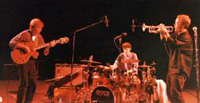 Dave Douglas's Tiny Bell trio had the appearance of youth and featured
an unusual configuration of trumpet, guitar, and drums. The compositions
were all original, and no sheet music was used by any band member.
Brad Schoeppach on guitar played off nicely against Douglas's trumpet.
Douglas was a constant stream of ideas, and I marveled at his ability
to play with such commanding authority over the lengthy sets. My only
negative reaction to the group related to its diversity of sound,
but Douglas’s originality made up for lack of variety.
Dave Douglas's Tiny Bell trio had the appearance of youth and featured
an unusual configuration of trumpet, guitar, and drums. The compositions
were all original, and no sheet music was used by any band member.
Brad Schoeppach on guitar played off nicely against Douglas's trumpet.
Douglas was a constant stream of ideas, and I marveled at his ability
to play with such commanding authority over the lengthy sets. My only
negative reaction to the group related to its diversity of sound,
but Douglas’s originality made up for lack of variety.
Gianluigi Trovesi presented two entertaining concerts fortified by
the strong rhythm supplied by two basses and cello, plus drums and
percussion. They laid down the familiar Trovesi rhythm lines, allowing
the horns to state the theme and then improvise. Pino Minafra provided
a little theater, but he was also an impressive contributor on trumpet.
The appeal of the band is in the compositions of Trovesi. They can
be very addictive. The club setting allowed the band to stretch out
more than it did at the concert venue. They improvised more and featured
the talents of the band better when given more time. Although I was
familiar with most of the selections, it was still exciting to see
this band live. Vancouver audiences thought so too.
Hearing Glenn Spearman live with his Double Trio was the high point
of the trip. Spearman and Larry Ochs emitted a piercing, penetrating
sound that soared and took me with it. The band used two drummers
who provided plenty of accent, color and drive but little soloing.
Chris Brown's piano playing was an added treat. The solos of Spearman
and Ochs, however, dominated the performance. As an improvising duo,
it would be hard to top them. The level of energy they exuded was
incredible, and the creative thinking that made up the free parts
was phenomenal. I was totally engulfed in their thunderous sound that
took off as a space missile. Spearman was ultra cool as a leader and
showed no emotion despite the fact that the music was so emotional.
I could not conceive of a better new music group.
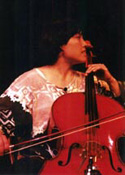 Joe
Williamson and Peggy Lee take their art seriously. These two virtuosi
were masters of instant composing, using a form of telepathy to transmit
their direction. It was heavy, brooding, atonal, unstructured, freeform
art being made before my eyes. There was not any similarity to the
Fred Hopkins / Deidre Murray duets I had witnessed, for this music
contained no melodic line. The Western Front setting was perfect for
this form of attention-grabbing art. Joe
Williamson and Peggy Lee take their art seriously. These two virtuosi
were masters of instant composing, using a form of telepathy to transmit
their direction. It was heavy, brooding, atonal, unstructured, freeform
art being made before my eyes. There was not any similarity to the
Fred Hopkins / Deidre Murray duets I had witnessed, for this music
contained no melodic line. The Western Front setting was perfect for
this form of attention-grabbing art.
Saul Berson plays a beautifully toned alto that is reminiscent of
the sound of Cannonball Adderley. Although he is a stalwart in the
NOW orchestra, he is much more effective in a small group context.
The band played a mixture of out pieces and standards that were spellbinding
for the late-night crowd. Tony Wilson's guitar playing has quite
melodic and complemented Berson perfectly. Berson's creative juices
kept flowing, and the band grooved on high. Berson is a highly competent
musician and a great discovery for me.
Brad Muirhead's group was a neat surprise and quite innovative. His
trombone pitted perfectly against the tenor of Graham Ord, while
Peter MacDonald played his guitar with abandon. The announced 'out'
pieces were really out, 'in' pieces were still very creative, and
even the blues entry was exciting. This band generated a big sound,
and the group interplay and the soloing were treats. They managed
to produce something special although the daylight open-air venue
was less than conducive to this.
The Georg Graewe trio played an esoteric set that definitely appealed
to a higher level of intellect. The compositions, although short,
were creatively constructed and gave each musician an opportunity
to present his or her serious side. Houle's playing was different
from that shown in other events he participated in this week. His
music here was serious, introspective, and heavy. As you would expect,
the listener's attention was demanded to enter their world.
Adding Plimley to the Evan Parker trio was pure magic. They soared
higher and higher, particularly with Parker on tenor. The interplay
between Plimley and Guy was magnetic, and they really seemed to enjoy
prodding each other. This music kept flowing at an intense level for
the duration of the set. It was amazing that these four could continually
put out creatively solid music in spite of the many gigs they were
required to play this week.
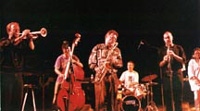 Francois Houle assembled a mighty international group to perform his
"Carmine Perpetuum", a work based on a poem by Robin Blaser. Featured
extensively was Evan Parker, but Houle allowed room for much bass/cello
interplay and stints by Douglas and himself. It was a weighty, lengthy
composition bordering on classical music except for the free improvisations.
Dark in tone, it progressed through several movements that included
readings of the poem by Leandre. This was a challenging work for both
the musicians and the audience.
Francois Houle assembled a mighty international group to perform his
"Carmine Perpetuum", a work based on a poem by Robin Blaser. Featured
extensively was Evan Parker, but Houle allowed room for much bass/cello
interplay and stints by Douglas and himself. It was a weighty, lengthy
composition bordering on classical music except for the free improvisations.
Dark in tone, it progressed through several movements that included
readings of the poem by Leandre. This was a challenging work for both
the musicians and the audience.
Willem Breuker has the unique ability of combining free jazz with
theater to make it palatable for the masses yet rewarding to the true
jazz fan. His Kollektief, an ensemble of talented (and aging) Europeans,
provided quite a show while still doing some serious playing. He showcased
everyone in the band and was able to draw the audience into it through
the antics of the players. When they were not clowning, the music
was very fine indeed.
As a duo Willem Breuker and Han Bennink put on a form of vaudeville,
with Breuker playing non-stop free improvisation and Bennink doing
his usual clowning on drums without missing a beat. There is no denying
he is a very dynamic drummer who literally assaults his instrument
and plays rhythm on everything in sight. This act had added cameo
performances by many of the Kollektief, who walked on stage independently
and blew for a half-minute or so. The set was very entertaining, but
I am a jazz purest who prefers music separate from comedy.
Marilyn Crispell's union with Fred Anderson was a gift to the music.
What I thought originally would be an unusual pairing of styles turned
out to be a perfect match. Anderson brings a bold, brawny tenor sound
to Crispell's wonderful improvisation, and the rhythm laid down by
Drake made it an exceptional trio. The respect they showed for one
another was quite evident. This set went by as if in a moment and
was highlighted by Drake's Moroccan rhythm sojourn opposite Crispell's
piano string strumming while Anderson oozed out low, smooth riffs.
Their concert was an exceptional one.
A power team was formed through adding two pianists, two bassists,
and a percussionist with a large array of tools to ROVA. They created
an incredible sound that was used to spotlight Ochs' long composition
"The Secret Magritte". The quartet did not commandeer the spotlight
but instead allowed the others to shine. And shine they did. The competition
between Guy and Ellis was electric, and Crispell's playing contained
magic. The piece had highs and lows of intensity and was compelling
from start to finish. This was one fine presentation.
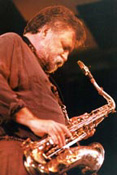 Evan Parker made yet another appearance in what started out as free
improvisation, but Bennink and Beresford could not resist cutting
up. Williamson, though, played it straight throughout the set. Parker
started strong, but he waned as the set lagged. It could have been
great music, but it ended up not being very satisfying.
Evan Parker made yet another appearance in what started out as free
improvisation, but Bennink and Beresford could not resist cutting
up. Williamson, though, played it straight throughout the set. Parker
started strong, but he waned as the set lagged. It could have been
great music, but it ended up not being very satisfying.
Kevin Elaschuk transmits a warm sound as trumpeter and leader of the
Stratochiefs. They were very effective in the development of their
tunes. Although the music was straight ahead, it was very engrossing,
particularly on the longer selections. This group was a pleasant surprise
for me. They put on a good show.
Gus
Janssen is a Dutch pianist playing with a mature group. They did
short but original pieces. Although there was a light bent to their
playing, it had its adventuresome moments. The music was not overpowering,
yet it was quite interesting to hear. It reminded me at times of
Gaslini's musical approach.
I witnessed numerous other performances over the fortnight, many of
which were memorable. My predominantly favorable responses are due
mainly to the artistry, but being able to select the shows you want
to see has its advantages. Vancouver has so much to offer, and the
main requirement for enjoying it all is stamina.
|
|
|
|
|

